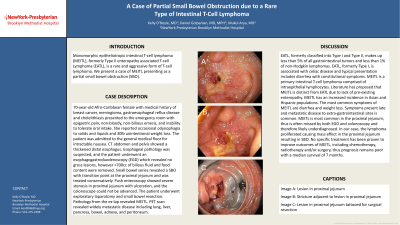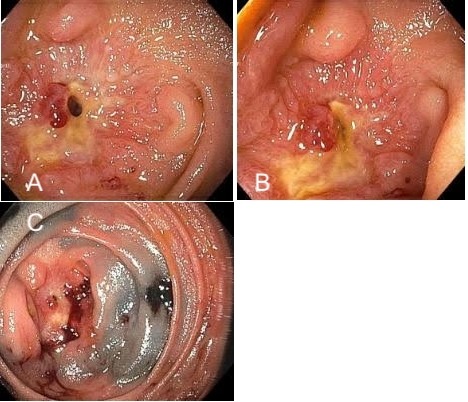Back


Poster Session C - Monday Afternoon
Category: Small Intestine
C0678 - A Case of Partial Small Bowel Obstruction due to a Rare Type of Intestinal T-Cell Lymphoma
Monday, October 24, 2022
3:00 PM – 5:00 PM ET
Location: Crown Ballroom

Has Audio

Kelly O'Boyle, MD
NewYork-Presbyterian Brooklyn Methodist Hospital
Brooklyn, NY
Presenting Author(s)
Kelly O'Boyle, MD, Daniel Golpanian, MD, MPH, Mukul Arya, MD
NewYork-Presbyterian Brooklyn Methodist Hospital, Brooklyn, NY
Introduction: Monomorphic epitheliotropic intestinal T-cell lymphoma (MEITL), formerly Type II enteropathy associated T-cell Lymphoma (EATL), is a rare and aggressive form of T-cell lymphoma. We present a case of MEITL presenting as a partial small bowel obstruction (SBO).
Case Description/Methods: 70-year-old Afro-Caribbean female with medical history of breast cancer, meningioma, gastroesophageal reflux disease and cholelithiasis presented to the emergency room with epigastric pain, non-bloody, non-bilious emesis, and inability to tolerate oral intake. She reported occasional odynophagia to solids and liquids and 30lb unintentional weight loss. The patient was admitted to the general medical floor for intractable nausea. CT abdomen and pelvis showed a thickened distal esophagus. Esophageal pathology was suspected, and the patient underwent an esophagogastroduodenoscopy (EGD) which revealed no gross lesions, however >700cc of bilious fluid and food content were removed. Small bowel series revealed a SBO with transition point at the proximal jejunum and was treated conservatively. Push enteroscopy showed severe stenosis in proximal jejunum with ulceration, and the colonoscope could not be advanced. The patient underwent exploratory laparotomy and small bowel resection. Pathology from the ex-lap revealed MEITL. PET scan revealed widely metastatic disease including lung, liver, pancreas, bowel, adnexa, and peritoneum.
Discussion: EATL, formerly classified into Type I and Type II, makes up less than 5% of all gastrointestinal tumors and less than 1% of non-Hodgkin lymphomas. EATL, formerly Type I, is associated with celiac disease and typical presentation includes diarrhea with constitutional symptoms. MEITL is a primary intestinal T-cell lymphoma comprised of intraepithelial lymphocytes. Literature has proposed that MEITL is distinct from EATL due to lack of pre-existing enteropathy. MEITL has an increased incidence in Asian and Hispanic populations. The most common symptoms of MEITL are diarrhea and weight loss. Symptoms present late and metastatic disease to extra-gastrointestinal sites is common. MEITL is most common in the proximal jejunum, thus is often missed by both EGD and colonoscopy and therefore likely underdiagnosed. In our case, the lymphoma proliferated causing mass effect in the proximal jejunum resulting in SBO. No specific treatment has been proven to improve outcomes of MEITL, including chemotherapy, radiotherapy and/or surgery, thus prognosis remains poor with a median survival of 7 months.

Disclosures:
Kelly O'Boyle, MD, Daniel Golpanian, MD, MPH, Mukul Arya, MD. C0678 - A Case of Partial Small Bowel Obstruction due to a Rare Type of Intestinal T-Cell Lymphoma, ACG 2022 Annual Scientific Meeting Abstracts. Charlotte, NC: American College of Gastroenterology.
NewYork-Presbyterian Brooklyn Methodist Hospital, Brooklyn, NY
Introduction: Monomorphic epitheliotropic intestinal T-cell lymphoma (MEITL), formerly Type II enteropathy associated T-cell Lymphoma (EATL), is a rare and aggressive form of T-cell lymphoma. We present a case of MEITL presenting as a partial small bowel obstruction (SBO).
Case Description/Methods: 70-year-old Afro-Caribbean female with medical history of breast cancer, meningioma, gastroesophageal reflux disease and cholelithiasis presented to the emergency room with epigastric pain, non-bloody, non-bilious emesis, and inability to tolerate oral intake. She reported occasional odynophagia to solids and liquids and 30lb unintentional weight loss. The patient was admitted to the general medical floor for intractable nausea. CT abdomen and pelvis showed a thickened distal esophagus. Esophageal pathology was suspected, and the patient underwent an esophagogastroduodenoscopy (EGD) which revealed no gross lesions, however >700cc of bilious fluid and food content were removed. Small bowel series revealed a SBO with transition point at the proximal jejunum and was treated conservatively. Push enteroscopy showed severe stenosis in proximal jejunum with ulceration, and the colonoscope could not be advanced. The patient underwent exploratory laparotomy and small bowel resection. Pathology from the ex-lap revealed MEITL. PET scan revealed widely metastatic disease including lung, liver, pancreas, bowel, adnexa, and peritoneum.
Discussion: EATL, formerly classified into Type I and Type II, makes up less than 5% of all gastrointestinal tumors and less than 1% of non-Hodgkin lymphomas. EATL, formerly Type I, is associated with celiac disease and typical presentation includes diarrhea with constitutional symptoms. MEITL is a primary intestinal T-cell lymphoma comprised of intraepithelial lymphocytes. Literature has proposed that MEITL is distinct from EATL due to lack of pre-existing enteropathy. MEITL has an increased incidence in Asian and Hispanic populations. The most common symptoms of MEITL are diarrhea and weight loss. Symptoms present late and metastatic disease to extra-gastrointestinal sites is common. MEITL is most common in the proximal jejunum, thus is often missed by both EGD and colonoscopy and therefore likely underdiagnosed. In our case, the lymphoma proliferated causing mass effect in the proximal jejunum resulting in SBO. No specific treatment has been proven to improve outcomes of MEITL, including chemotherapy, radiotherapy and/or surgery, thus prognosis remains poor with a median survival of 7 months.

Figure: Image A proximal jejunum
Image B proximal jejunum
Image C proximal jejunum
Image B proximal jejunum
Image C proximal jejunum
Disclosures:
Kelly O'Boyle indicated no relevant financial relationships.
Daniel Golpanian indicated no relevant financial relationships.
Mukul Arya indicated no relevant financial relationships.
Kelly O'Boyle, MD, Daniel Golpanian, MD, MPH, Mukul Arya, MD. C0678 - A Case of Partial Small Bowel Obstruction due to a Rare Type of Intestinal T-Cell Lymphoma, ACG 2022 Annual Scientific Meeting Abstracts. Charlotte, NC: American College of Gastroenterology.
